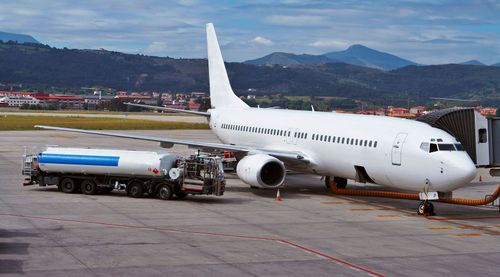Washington to launch rulemaking to incorporate SAF provisions into CFS regulations

January 5, 2024
BY Erin Krueger
The Washington Department of Ecology on Dec. 18 published a notice announcing plans to update the state’s clean fuels program regulations to align with legislation signed into law last year that aims to promote the production and use of low-carbon alternative jet fuels, more commonly referred to as sustainable aviation fuel (SAF).
The bill, SB 5447, was signed by Gov. Jay Inslee in May 2023. The legislation aims to encourage the manufacture and purchase of sustainable aviation fuel (SAF) though tax incentives. It also requires the Washington State Department of Ecology, the agency tasked with implementing the state’s Clean Fuels Standard, to allow one or more carbon intensity (CI) pathways for alternative jet fuel.
The Dec. 18 notice published by the Department of Ecology states that the upcoming rulemaking will align with SB 5447 by updating the date at which SAF pathway applications can be submitted for CFS credit generation. The rulemaking may also consider other changes to strengthen and/or streamline the CFS program, including the establishment of requirements for third-party verification program for fuel pathway applications and data reports submitted by program participants; updating requirements to further encourage the production of low carbon intensity SAF’ amending/refining the compliance and enforcement process for the CFS; updating the rule language to improve clarity and readability, align the rule with guidance documents, correct errors, and make miscellaneous improvements to program implementation; updating book-and-claim accounting requirements for electricity and biomethane; and harmonizing the rule with Oregon and/or California low carbon or clean fuel program requirements. The agency said it is not considering amending other main components of the program, including annual carbon intensity standards, the Tier 2 WA-GREET model, and land use change factors.
Advertisement
Advertisement
The Department of Ecology plans to hold stakeholder meetings and develop and prepare rule language starting in January. A proposed rule is currently expected to be released in the fall of 2024, with promulgation of a final rule currently expected in winter 2025.
Additional information is available on the Department of Ecology website.
Advertisement
Advertisement
Related Stories
U.S. fuel ethanol capacity fell slightly in April, while biodiesel and renewable diesel capacity held steady, according to data released by the U.S. EIA on June 30. Feedstock consumption was down when compared to the previous month.
XCF Global Inc. on July 8 provided a production update on its flagship New Rise Reno facility, underscoring that the plant has successfully produced SAF, renewable diesel, and renewable naphtha during its initial ramp-up.
EcoCeres Inc. has signed a multi-year agreement to supply British Airways with sustainable aviation fuel (SAF). The fuel will be produced from 100% waste-based biomass feedstock, such as used cooking oil (UCO).
President Trump on July 4 signed the “One Big Beautiful Bill Act.” The legislation extends and updates the 45Z credit and revives a tax credit benefiting small biodiesel producers but repeals several other bioenergy-related tax incentives.
SAF Magazine and the Commercial Aviation Alternative Fuels Initiative announced the preliminary agenda for the North American SAF Conference and Expo, being held Sept. 22-24 at the Minneapolis Convention Center in Minneapolis, Minnesota.
Upcoming Events










